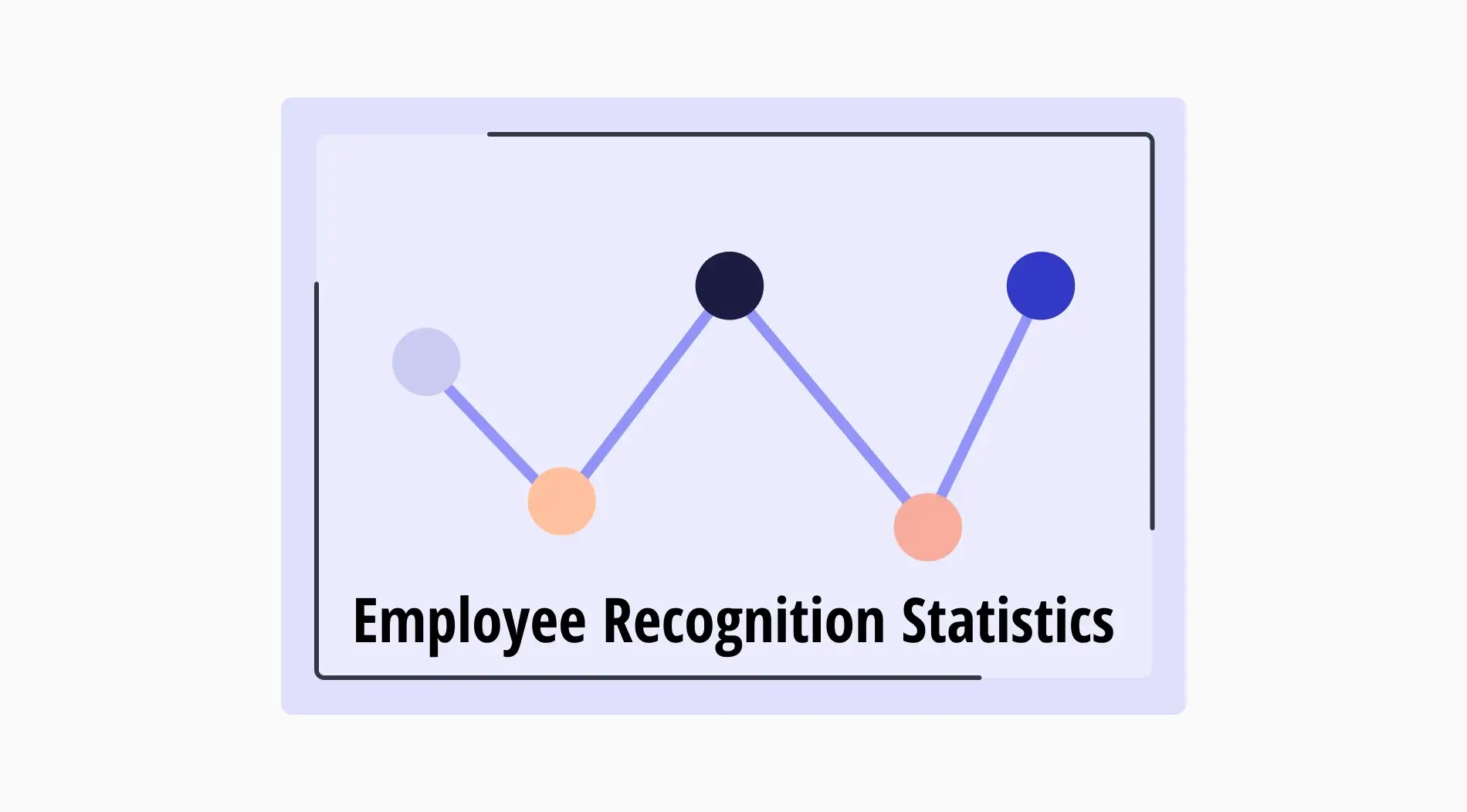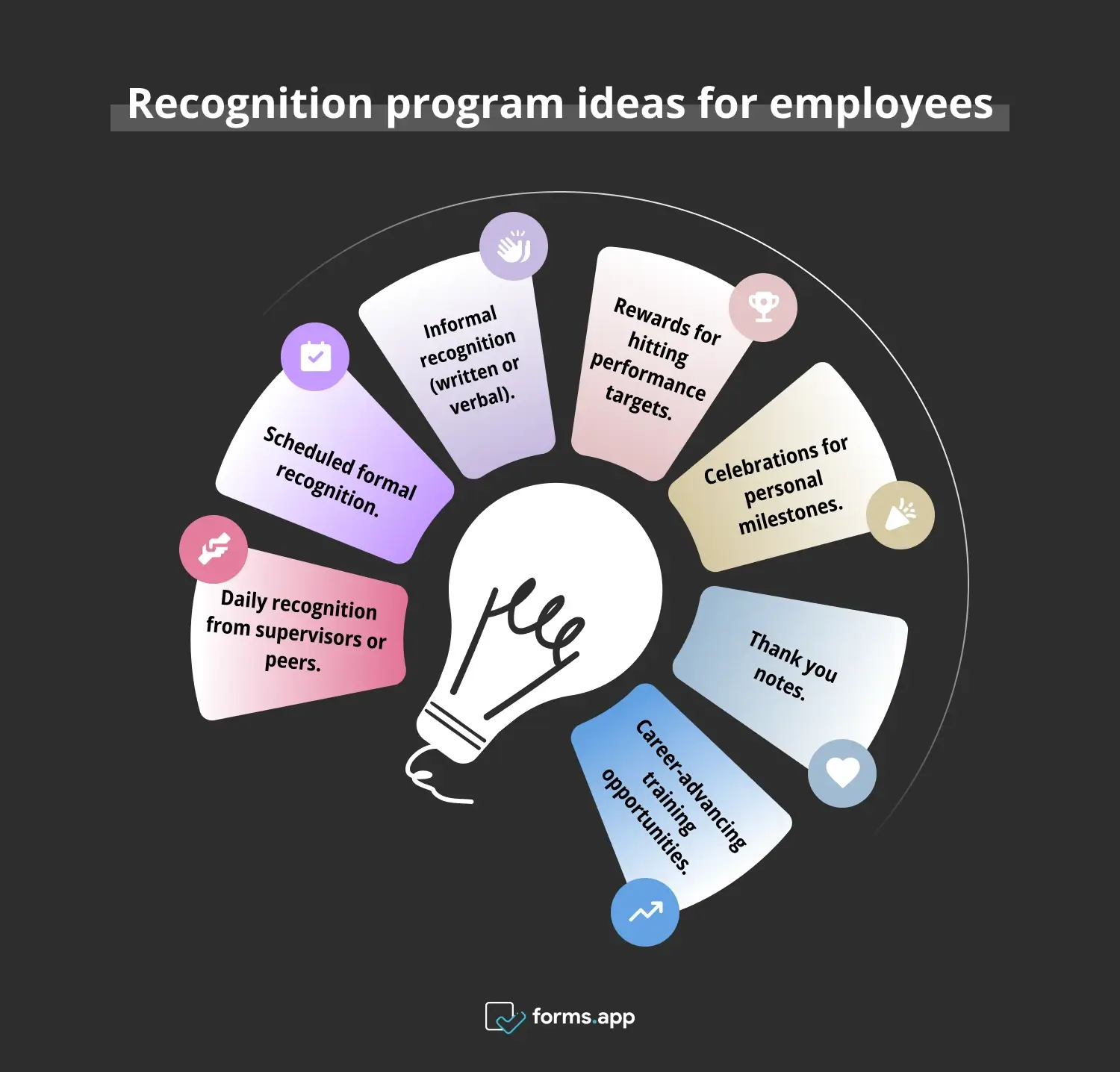
Motivated employees and a healthy work environment are vital to a company's success. Companies that do not value their employees and do not make them feel appreciated cannot be successful. Motivating employees and increasing their productivity is possible with an effective employee recognition strategy. You can improve employee loyalty and ensure employee satisfaction thanks to employee recognition.
Through employee recognition programs, you can appreciate the efforts and achievements of your employees. The 25+ employee recognition statistics we have prepared for you will guide you in this regard. You will also learn what employee recognition is and how to implement recognition programs. Now let's move on to our article that will teach you the subject:
What is employee recognition?

Employee recognition means acknowledging and appreciating the employees' work and efforts in the workplace.
Employers can use employee recognition to reward and make employees feel valued. It can be done in many different ways, including written, verbal, or through rewards, and it increases employee productivity.
25+ Amazing employee recognition statistics to get ideas
Employee recognition builds employee loyalty and reduces turnover rates. With the 25+ employee recognition program statistics we have prepared for you, you will grow your company by ensuring employee satisfaction. You will also see which employee recognition programs you can implement to make your employees feel valued. Now, take a look at 25+ employee recognition statistics:
1. Happy and recognized employees are more motivated for their work.
Workhuman has provided a statistic showing the advantages of a company with happy employees. Happier employees spend 46% more time on their tasks, help colleagues 33% more frequently, and report feeling 65% more motivated at work. Employee recognition has a significant impact on employee happiness.
Employee recognition ensures that the efforts and achievements of employees are appreciated. Employees whose achievements are appreciated by their employers are more peaceful and productive in their work environment. In this way, employee recognition contributes to both employees and companies.
2. 83.6% of employees think that recognition has an impact on their motivation.
According to Nectar’s survey, 83.6% of workers believe that employee recognition has an impact on their motivation to perform effectively at work. This statistic clearly shows the contribution of recognizing and appreciating your employees to the success of your company.
Recognized employees have higher job satisfaction and are more productive for the organization they work for. In this way, both employees and employers benefit from employee recognition programs. If you want to create a positive working environment and be successful in the long term, you should pay attention to employee recognition.
3. Adopting employee recognition strategies makes companies profitable.
Ensuring employee engagement enables companies to increase their sales and their profit. The eye-opening statistic published by Deloitte supports this situation. According to their survey, company margin might increase by 2 percent for every 15 percent increase in employee engagement.
Employees who feel that their efforts are seen and appreciated tend to be more loyal to the company they work for and make more effort. In this way, they become more valuable to their companies and enable their companies to make more profit.
4. Employee recognition enables job satisfaction.
According to Zippia, 37% of employees believe recognition is the most crucial element in determining their job satisfaction. Furthermore, 69% of employees say they are willing to work harder if they feel more valued at work, emphasizing the potential impact of recognition on productivity.
These statistics underscore the power of recognition in shaping a positive work environment. Increasing your employees' job satisfaction and creating a workplace culture in your company is possible with employee recognition strategies. Employees with increased job satisfaction will be more productive and contribute to your company's growth.
5. Recognition among coworkers moves them forward.
Employee recognition and appreciation are not just the employer's responsibilities. It's equally essential for colleagues to recognize each other's efforts. The statistics published by Workhuman also prove this situation. In fact, 89% of HR directors agree that recognition and feedback from peers significantly benefit their companies.
In businesses where employees appreciate each other's achievements and efforts, cooperation increases, and teamwork is encouraged. Teamwork is critical to a company's success. In companies where teamwork is adopted, employee performance improves, and the labor force is used more efficiently.
6. The employee recognition market is worth 46 billion dollars globally.
If you are curious about the value of the employee recognition market worldwide, you should take a look at this statistic prepared by Forbes. Their data tells you that the market for employee recognition is worth 46 billion dollars worldwide.
This statistic indicates that employee recognition is gaining importance worldwide, and investments in this area are increasing. Companies are investing in employee recognition programs to improve employee performance and motivate them. This has led to the growth of the employee recognition market.
7. 28% of employees never receive CEO or executive team recognition.
Nectar's valuable research showed the importance of CEOs and supervisors recognizing employees' achievements. 28% of workers never receive recognition from the organization's CEO or executive team, and 33% of workers say feedback from CEOs and executives is the best.
Recognizing employees' achievements is not just a gesture, it's a strategy to ensure employee engagement. Engaged employees are not only crucial for customer satisfaction but also lead to increased sales. Therefore, it's essential to implement recognition programs and methods, such as gift cards and reward programs, to make your employees feel valued.
8. 66% of workers say they would leave if they didn't feel appreciated at work.
Employees' feeling that they are valued at work directly affects their motivation, commitment, and overall performance. 66% of employees claim they would quit their jobs if they didn't feel valued. This statistic by Select Software Reviews underscores the crucial role of employee recognition in fostering a positive work environment.
Employers who do not make their employees feel valued and recognized for their achievements will fail in the long run. This is because unappreciated employees tend to leave their workplace. In this way, high employee turnover rates occur, leading companies to fail.
9. Recognition in the workplace increases employee engagement.
Businesses with highly engaged employees experience a remarkable 17% increase in productivity and a 21% boost in profitability compared to those with disengaged employees. Wellable's statistic is a powerful motivator for employers and HR professionals to invest in employee engagement and recognition.
Employee recognition programs have a positive impact on workplace productivity and profitability by increasing employee motivation and commitment. They also create a positive atmosphere in the workplace and ensure productivity. Therefore, you should reconsider the priority you give to the employee recognition experience in your company.
10. Clear employee expectations and regular feedback are key to employee satisfaction.
Zippia's survey on HR professionals shows you the most essential ways to increase your employees' engagement. According to their data, clear employee expectations and regular feedback are the best ways to boost employee engagement, according to 89% of HR professionals.
Clear expectations make employees feel secure at work and prevent them from facing unexpected pressures. In this way, employee experience improves, and a peaceful working environment is provided. In addition, regular feedback supports employees' development by increasing their performance and self-confidence.
11. Commitment and recognition at work are correlated with each other.
Nectar published a statistic revealing the relationship between employee recognition and employee engagement. 81.9% of employees concur that receiving credit for their efforts raises their engagement. Moreover, 39% of employees strongly agree that engagement and recognition at work are correlated.
When employees see that their work is appreciated, they feel valuable, and their commitment to their workplace increases. Employees who are recognized by their colleagues and employers are more satisfied with their work, and their productivity improves. This not only boosts their satisfaction and productivity but also plays a crucial role in shaping a positive and thriving workplace culture.
12. Employee recognition contributes to building a corporate culture.
Workhuman provided a statistic showing the positive impact of employee service award programs on employee experience, employee connections, and company culture. HR directors report that their employee recognition programs improve employee experience by 89%, employee connections by 86%, and organizational culture by 85%.
You can ensure that your employees enjoy their job more through employee recognition programs at work. Employees who enjoy their jobs will create a positive company culture. You will retain these employees, and attracting new talents to your company will be easier.
13. 39% of employees feel unappreciated.
TeamStage's research has shown that employers are not sufficiently adopting employee recognition programs. Although 77% of workers would agree to put in more effort if they were given more credit, 39% of workers feel underappreciated. The high percentage of respondents who do not feel appreciated is a warning to employers.
Failure to recognize employees and appreciate their efforts reduces their motivation and causes them to be unhappy. Thus, productivity decreases, and employees tend to change jobs. To prevent this, you should recognize and appreciate your employees. By appreciating them, you improve their morale and ensure employee satisfaction.
14. Employee recognition improves employee engagement.
Businesses with high employee involvement will be ahead of their competitors. Gallup found that employee involvement is increasing once more following a decline in 2020 due to the pandemic, reaching a record high of 23% in 2022. Recognizing employees is one of the most basic ways to increase employee engagement.
Increased employee engagement means that employees feel more committed and motivated to their work. Companies that recognize their employees contribute to a better work-life balance and a happier workplace. Employees who see that their work is valued increase their engagement and work more efficiently.
15. Employee recognition programs reduce work stress.
Heavy workloads and lack of proper communication in the workplace cause employees to experience work stress. According to the American Institute of Stress, 65% of employees reported that workplace stress led to difficulties, with over 10% mentioning significant adverse effects.
Employee recognition has a significant role in preventing employees from experiencing work stress. Employees who see that their colleagues and supervisors appreciate their efforts experience less work stress. In companies where employee recognition programs are implemented, a positive working environment prevents employees from work stress.
16. In organizations prioritizing employee recognition, there is a 14% increase in performance, productivity, and employee engagement.
Employees want to feel that their efforts and contributions are recognized. Performance, productivity, and employee engagement are 14% higher in companies that value employee recognition. This statistic by Deloitte reveals that companies that value and recognize their employees perform better.
Companies that attach importance to employee recognition positively affect employee preferences. This situation enables companies to retain their employees and provide a stable working environment. In this way, companies can save on employee costs and use their budgets more effectively.
17. Transparency in workplaces builds trust and boosts performance.
Workhuman found that a staggering 92% of respondents expressed that they would place more trust in a senior leader who openly acknowledges their mistakes. This transparency builds trust and boosts performance, as 85% of respondents believe they would succeed in a high-trust work environment.
Work environments where managers are transparent and honest make employees feel valued. In this way, a solid corporate culture emerges, and a productive work environment is created. Businesses where employees are recognised and made to feel valuable will be ahead of their competitors.
18. Non-financial employee recognition should be preferred for employee satisfaction.
The employee recognition strategy can be implemented in many different ways. Some examples are giving rewards on work anniversaries or giving public recognition to employees. According to research by McKinsey & Company, non-financial recognition can account for as much as 55% of employee engagement.
Non-financial recognition refers to the verbal or written recognition of employees' achievements. Being recognized in this way makes employees feel valued and show higher productivity. Therefore, you should develop your employee recognition strategies and take care to recognize your employees.
19. Companies with highly engaged employees see an increase in revenues.
Employees who are regularly appreciated and recognized feel valued and committed to their work. According to Business Leadership Today’s research, companies with highly engaged workers saw increases in overall returns to shareholders of 13% and revenue per employee of 26%.
The commitment that employees feel towards their jobs not only enables them to achieve a better work-life balance but also contributes to the success of companies. Therefore, you can increase employee engagement through employee recognition programs to boost your company’s profits.
20. Peer-to-peer recognition and employer recognition are critical to the success of companies.
Nectar has conducted research showing employers' importance in the employee recognition process. According to the research results, 40% of workers rank managers as the group that affects them the most in terms of recognition. On the other hand, 28% of employees say feedback from their team members has the most influence.
Employees who are appreciated by their employers and teammates feel valued and have a more positive attitude toward them. This increases cooperation and strengthens team spirit. For this reason, you should also pay attention to your attitude towards your employees and employee recognition.
21. Recognition encourages 37% of employees to be productive.
Adopting employee recognition strategies is the most effective way to motivate your employees. Great Place To Work conducted a study on employees and showed the effect of recognition on the quality of their work. 37% of participants indicated that receiving more personal recognition would encourage them to produce better work regularly.
Employees who are regularly appreciated are more committed to their work and more motivated to contribute to the company they work for. For this reason, you should show your appreciation to your employees regularly to motivate them and increase efficiency.
22. Employee recognition reduces turnover rates.
Apollo Technical revealed the effect of employee recognition on employee loyalty with the statistics they prepared. According to them, recognition increases an employee's likelihood of staying in their current position for the next three to six months by 63%.
Recognition makes employees feel valued and happy in their current jobs. Employees who feel valued in their current company will be less likely to leave their jobs. For this reason, you should pay attention to employee recognition to keep your talents.
23. Recognition strategy leads to an increase in employee performance.
A valuable study conducted by Gartner proved that a well-crafted recognition and rewards program can raise average employee performance by 11.1%. According to this data, your company will benefit from the investments you make in employee recognition.
There are many different ways to create a useful employee recognition program. This includes giving feedback to your employees and providing them with development opportunities. By creating recognition programs that motivate them, you can improve your employees' performance.
24. Companies using employee recognition programs have higher success rates.
Quantum Workplace's data will guide you in employee recognition. Compared to companies without any program at all, those with official employee recognition programs have a 31% decrease in voluntary turnover. Also, their chances of achieving successful business outcomes are 12 times higher.
Adopting employee recognition strategies enables you to achieve employee loyalty. Making your employees feel valued makes them enjoy their work and makes your company successful. You can also create a positive working environment and increase your ability to attract labor. For these reasons, you should prioritize employee recognition and reward your employees.
25. More recognition means lower turnover rates.
Employees who are recognized by their employers create culture and stability in the companies they work for. Nectar found that 71% of employees say they would be less likely to quit their jobs if they received more recognition from their employers. Furthermore, meaningful recognition impacts job satisfaction, according to 87% of employees.
Employee recognition strategies reduce turnover rates by improving employee experience and employee satisfaction. Employers can achieve this by recognizing the achievements and efforts of their employees. Using different types of recognition strategies will increase the likelihood of improving the employee experience.
Recognition program ideas to use
Employee recognition comes in many different forms and is necessary for any successful company. It increases employees' self-confidence and encourages them to be creative. Creating an effective employee recognition program will directly affect your company's profits. Here are some employee recognition program ideas for you to use in your business:

Recognition program ideas for employees
- Daily recognition by supervisors or peers.
- Planned formal recognition at regular periods.
- Written or verbal informal recognition.
- Performance-based target achievement rewards.
- Personal special occasion celebrations.
- Thank you notes.
- Training opportunities that enable employees to progress in their careers.
Key points to take away
Regularly recognizing and congratulating employees increases their self-confidence and makes them feel satisfied with their jobs. With the 25+ employee recognition statistics we have prepared for you, you will learn how to appreciate your employees and create a positive working environment. By reading our statistics, you will make your employees more productive for your company.
Now that you have learned everything you need about employee recognition, you are ready to increase the productivity of your employees!
Fatih is a content writer at forms.app. He is also a translator and interpreter. Fatih loves reading and writing. He is passionate about exercising and traveling. His specialties are surveys, statistics, and translation.



 13 min ler
13 min ler

